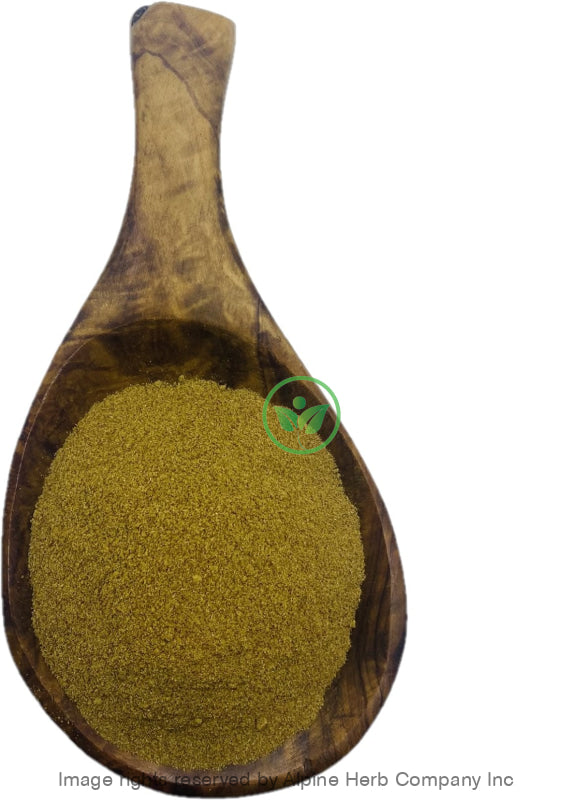Chamomile Flower Powder Alpine Herb Company Inc.
$ 8,99 $ 5,39
Botanical Name: Matricaria chamomilla
Common Name:
- English: German chamomile
- Also, Known As: Wild Chamomile, Garden Chamomile, Ground Apple, Pinheads, Baabunaa, Babuna Camornile, Babuna, Babunj, English chamomile, Scented mayweed, Camomilla, Flos Chamomile, Single Chamomile, and Sweet False Chamomile.
Habitat: Europe and Asia
Origin: Egypt
Harvested: Cultivated
Part used: Whole Flower
General Information:
Matricaria chamomilla is a well-known medicinal plant species from the Asteraceae family often referred to as the “star among medicinal species.” Nowadays it is a highly favored and much used medicinal plant in folk and traditional medicine.
There are two different types of chamomile: German Chamomile (Matricaria chamomilla) and Roman Chamomile (Chamaemelum nobile). While there are some similarities between the two, there are also significant differences. This information provided here is for German Chamomile. It is native to southern and eastern Europe but has spread all over the world either in the garden or growing as a weed in disturbed soils.
Chamomile is a member of the Asteraceae plant family and has an appearance like daisies. Chamomile is an annual plant with thin spindle-shaped roots only penetrating flatly into the soil. The plant grows to a height of about 3-4 feet and has small daisy like yellow flower heads with white petals. The long and narrow leaves are bi to tri pinnate. The flower heads are placed separately, they have a diameter of 10–30 mm, and they are pedunculated and heterogamous.
Humans have been interacting with chamomile for tens of thousands of years.
How to use:
Powdered Herb:
There are different ways to use powdered herb.
Food Preparation: You can add powdered herb to any super food herbal smoothie, sauces, spreads and even cookies. Also for children, you can mix powdered herb with honey or glycerin to make paste. The thicker the paste, the more potent and herbal in taste. The sweet taste of honey and glycerin will help medicine go down. This method is also known as “Electuaries”.
Capsules: Encapsulating your own powdered herb at home, gives you assurance that the contents of the capsules are pure herb and no filler or any other products. These capsules can be taken with liquid.
Poultice: Poultice can be made with an herbal powder and liquid (mostly water) to form a paste which is then applied to the skin. This method is very helpful for skin conditions.
Herbal shot: Powdered herb can be mixed with water, fruit juice or other liquid to make herbal shot.
Precautions:
You should consult with a qualified healthcare practitioner before using any herbal products, particularly if you are pregnant, nursing, or on any medications.
All information on this website is for educational purpose ONLY
This information has not been evaluated by Health Canada.
This information is not intended to diagnose, treat, cure, or prevent any disease.
| Unit Size | 100g, 200g, 400g, 1kg |
|---|
Prompt shipping and expert packing
Thanks to our longstanding association with UPS FedEx DHL as well as other leading global carriers, we can offer a variety shipping options. Our warehouse staff is highly trained and will be able to pack your goods in accordance with our precise and exact specifications. Your items will go through an exhaustive examination before they will be securely packaged before being delivered. We ship to hundreds of thousands of customers daily in different countries. This is a sign of our determination to become the largest online retailer worldwide. Warehouses and distribution centers are located throughout Europe as well as in the USA.
Note that orders containing multiple items are processed according to the particular item.
We will thoroughly inspect all items ordered before shipping. Most orders are shipped within 48 hours. The delivery time will be between 3 and 7 working days.
Returns
The stock market is always changing. It's not entirely managed by us since we're involved with several entities, including the factory and the storage. Therefore, the actual inventory could fluctuate at any moment. Please be aware that it is possible that your order could be out of stock after you've placed your order.
Our policy lasts for 30 days. If it's been more than 30 days since the date you purchased your item We're sorry to say that we can't offer you a full exchange or refund.
You can only return a product if it is unused and still in the same state as when you received it. The item should be in the original packaging.
Related products
Herb Powder
Herb Powder
Herb Powder
Herb Powder
Herb Powder
Herb Powder
Herb Powder
Herb Powder
Herb Powder
Herb Powder
Herb Powder
Herb Powder
Herb Powder
Herb Powder
Herb Powder
Herb Powder
Herb Powder


































